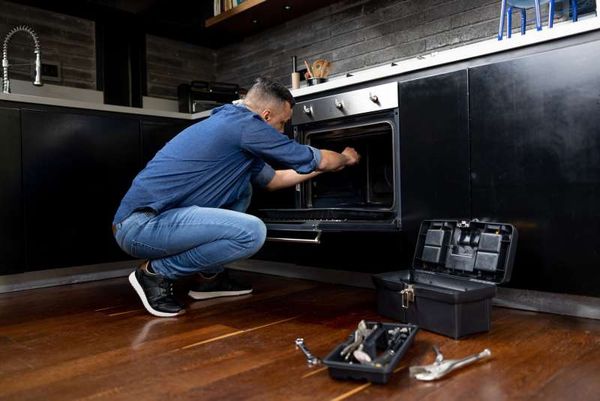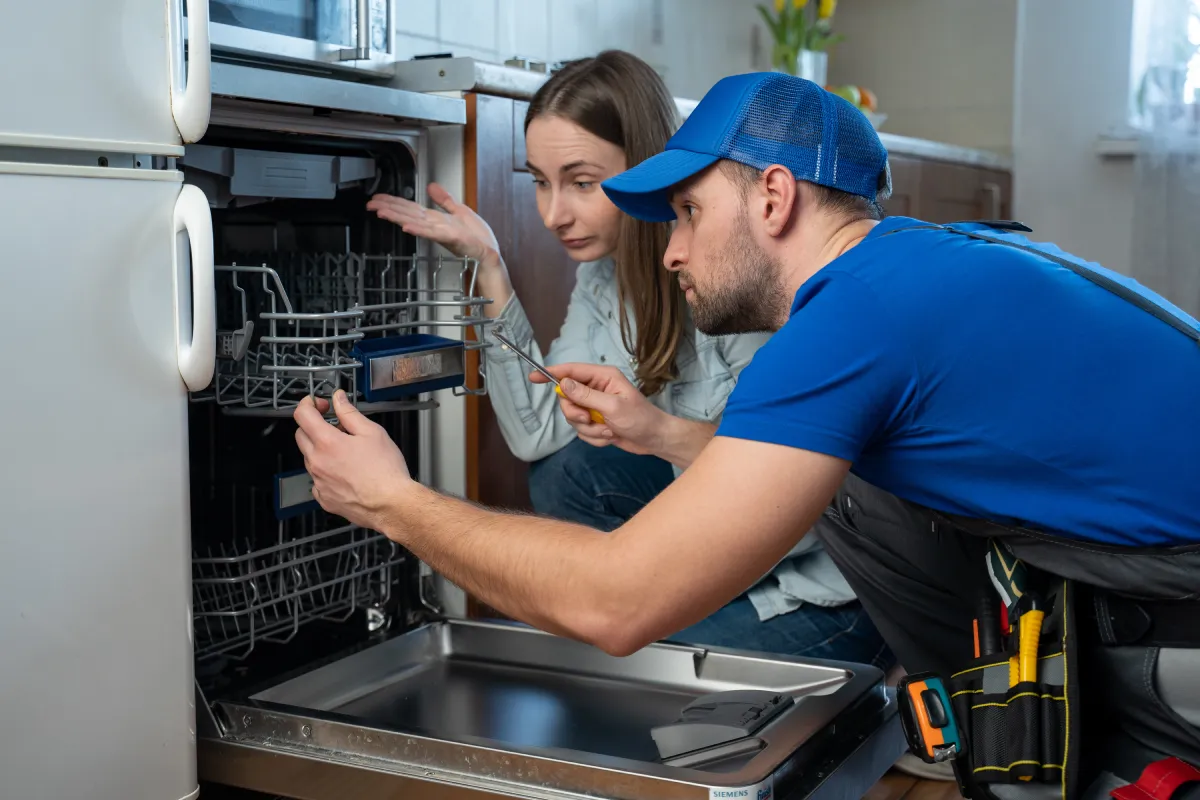The Ultimate Guide to Understanding Device Repair at Home
When your refrigerator stops cooling down or your stove rejects to warmth, it can feel overwhelming. Comprehending home appliance repair at home can save you time and cash. You'll learn to identify symptoms, make use of essential devices, and comply with an organized troubleshooting procedure. But prior to you begin, there are critical security preventative measures you need to consider. What are one of the most usual issues, and how can you repair them? Let's discover the fundamentals.
Common Home Appliance Issues and Their Symptoms
When your home appliances begin acting up, it's necessary to identify the indications at an early stage. Disregarding them can cause bigger problems and expensive repair work. For instance, if your refrigerator isn't cooling down effectively, you could notice cozy spots or condensation developing. This might suggest a failing compressor or an obstructed vent.Your dish washer may reveal troubles with unclean recipes or uncommon sounds during cycles. If you listen to grinding or clanking, it's time to investigate.A washing device that won't spin or drain can leave you with soaked laundry, recommending a blocked drainpipe or a malfunctioning pump.Lastly, if your oven's temperature level appears off or it takes for life to pre-heat, you could be taking care of a faulty thermostat. By remaining sharp to these signs and symptoms, you can resolve problems prior to they intensify into major repair work.
Crucial Devices for Appliance Fixing
When you're dealing with home appliance repair services in the house, having the right devices is necessary. Standard hand tools like screwdrivers and pliers will help you disassemble and repair various appliances, while electrical screening tools ensure you're working safely with wiring. Let's go over what you need to begin on your repair journey.
Standard Hand Tools
Having the right devices is vital for reliable home appliance repair in the house. Begin with a reputable screwdriver collection, including both flathead and Phillips kinds, as screws prevail in device assembly. Pliers are additionally essential; they assist with gripping, turning, and cutting cords or little elements. A set of needle-nose pliers can get to difficult situations easily. You'll require an excellent flexible wrench for tightening or loosening nuts and screws. An utility knife comes in handy for cutting with packaging or insulation. Don't forget a sturdy workbench or surface to safely arrange your devices and parts. With these basic hand tools, you'll be well-prepared to tackle most appliance fixings that come your method.
Electrical Testing Gadgets
Together with standard hand tools, electrical testing gadgets play a vital role in appliance fixing. These tools help you identify electrical concerns and warranty devices operate safely. A multimeter is important; it measures voltage, current, and resistance, permitting you to pinpoint issues swiftly. A non-contact voltage tester is another must-have, allowing you spot real-time cords without making direct get in touch with, improving your safety and security. Clamp meters are terrific for determining current flow in wires without separating them, saving you time and effort. In addition, circuit testers can quickly check if outlets are operating correctly. By using these gadgets, you'll simplify your troubleshooting process and improve your fixing abilities, making appliance maintenance a great deal much easier.
Step-by-Step Overview to Diagnosing Appliance Issues
When your home appliance breaks down, it can be irritating, yet detecting the problem doesn't need to be frustrating. You'll discover to recognize usual troubles and apply efficient repairing techniques. Allow's go through the steps to get your device back in working order.
Typical Home Appliance Problems

Troubleshooting Methods Described

Repairing Significant Kitchen Area Appliances: A Closer Look
Have you ever before wondered just how to tackle typical issues with your cooking area home appliances? Fixing major cooking area appliances like fridges, ovens, and dish washers can be much easier than you believe. Beginning by determining the issue-- whether it's a fridge not cooling or an oven that won't warm. Frequently, a straightforward reset or checking the power resource can address the issue.For fridges, clean the condenser coils and inspect the door seals. If your oven's not home heating, inspect the burner and thermostat. Dishwashing machines could simply require a clean filter or a reset to get them back in activity. Always unplug the home appliance before diving right into repair services to guarantee your safety.Don' t neglect to consult the customer manual for certain troubleshooting suggestions connected to your model. With a little bit of perseverance and the right tools, you can confidently deal fridge freezer repairs with device repair work and conserve cash at the same time!

Fixing Laundry Appliances: Tips and Techniques
When your washing home appliances begin acting up, it can really feel frustrating, but fixing them doesn't have to be an inconvenience. Start by inspecting the power supply. Validate the appliance is plugged in and the electrical outlet is operating. Next, check the door or cover button; a malfunctioning switch can prevent the maker from operating.For washers, if it's not spinning, look for out of balance tons. Rearranging the clothing could solve the problem. If your clothes dryer isn't heating, tidy the lint filter and check the vent for blockages.Listen for uncommon noises; they can show a problem. If your appliance is leaking, check the tubes for splits or loosened links. Paper any kind of mistake codes displayed on digital displays, as they can lead you in identifying the issue. Lastly, get in touch with the user handbook for specific repairing ideas associated to your version.
Safety And Security Preventative Measures to Take During Services
Prior to you begin any kind of appliance repairs, it's important to focus on security to stop mishaps or injuries. Unplug the device or transform off the circuit breaker to assure no power reaches it while you function. Use protected tools to minimize the threat of electrical shock. Wear security goggles and handwear covers to secure on your own from sharp sides or debris (Lg Dryer repair near me Dependable Refrigeration & Appliance Repair Service).Make certain your workspace is neat and well-lit, so you can see what you're doing. Keep youngsters and family pets away from the location to stay clear of interruptions and possible risks. If you're taking care of gas appliances, be added cautious; check for leakages before proceeding.Take your time, and don't rush through repairs. If you feel unsure concerning any kind of action, it's far better to stop and research than to presume. Complying with these safety measures will aid produce a much safer environment for your DIY appliance repair task
When to Call a Professional for Aid
Exactly how do you recognize if it's time to employ a professional for appliance repairs? If you have actually tried basic troubleshooting without success, it's a clear indicator. For circumstances, if your device still won't begin or reveals uncommon sounds after resetting it, do not wait to look for specialist help.When you notice leaks, smoke, or burning smells, prioritize security and call a professional instantly. These concerns can bring about even more significant damages or present threats to your home.Also, if your home appliance is under warranty, calling an expert is often the finest course. They can guarantee that repair services won't invalidate your warranty, saving you cash in the lengthy run.Finally, if you're unsure or unpleasant with complicated repair services, it's smart to leave it to the specialists. Bear in mind, taking on complicated problems without the right experience can result in pricey mistakes. Count on a specialist when doubtful!
Often Asked Inquiries
Exactly How Can I Protect Against Home Appliance Troubles in the Future?
To stop home appliance issues in the future, you must do regular maintenance, check for damage, tidy filters, and prevent overloading. Remaining positive will aid prolong their lifespan and maintain them running efficiently.
What Are one of the most Common Do It Yourself Home Appliance Repair Mistakes?
You may overlook safety preventative measures, skip repairing actions, or use inaccurate devices when attempting DIY appliance fixings. Rushing the procedure or disregarding maker guidelines can bring about more substantial problems and expensive mistakes. Keep patient and educated!
How Do I Know if a Component Requirements Substitute?
You can inform if a component requires substitute by looking for unusual noises, leaks, or inconsistent performance. If the home appliance struggles to operate correctly or shows visible damages, it's useful link most likely time for a substitute.
Can I Make Use Of Generic Components for Home Appliance Repairs?
Yes, you can use generic parts for device repair work, however ascertain they're suitable - Dryer repair visit here Oro Valley Dependable Refrigeration & Appliance Repair Service. Common components may conserve you money, however they can affect performance or longevity, so weigh your options thoroughly prior to deciding
What Service Warranties Cover Home Appliance Fixes?
Most appliance warranties cover repair work for manufacturing issues, however they often exclude damages from abuse. Inspect your service warranty terms carefully, as some could call for making use of licensed technicians and original parts for insurance coverage to continue to be valid.